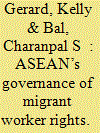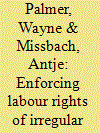| Srl | Item |
| 1 |
ID:
157891


|
|
|
|
|
| Summary/Abstract |
Temporary migrant workers in Southeast Asia are subject to various abuses in recruitment, work and repatriation. A decade ago ASEAN governments committed to developing an Instrument governing migrant worker rights, but a series of deadlocks have stymied this agreement. Prevailing accounts explain this impasse as the consequence of incompatible national interests, norms of non-interference and consensus, a lack of institutional capacity and the limits of rights advocacy in ASEAN. Conversely, utilising a political economy framework, this article demonstrates this impasse in regional governance reflects societal-level conflicts among migrant workers, civil society organisations, business groups and state-based actors, generated by the latter’s adoption of migrant labour as both a livelihood and development strategy.
|
|
|
|
|
|
|
|
|
|
|
|
|
|
|
|
| 2 |
ID:
166685


|
|
|
|
|
| Summary/Abstract |
The multi-directional nature of labour migration flows has resulted in an increasing number of countries having become both senders and receivers of regular and irregular migrants. However, some countries continue to see themselves primarily as senders and so ignore their role as a receiving country, which can have negative implications for the rights of migrants in their territory. Using the example of Indonesia, which is State Party to the 1990 UN Convention on the Rights of All Migrant Workers and Their Families, this article demonstrates that irregular migrant workers in this country have the legal right to protection against labour exploitation even when they work despite the government’s prohibition on employment. The article discusses the ‘right to work’ and how international human rights law has translated it into the ‘right to protection from labour exploitation’ for irregular migrants in Indonesia. By way of two case studies about the Indonesian government’s handling of irregular migrants, it shows how it prioritises enforcement of the employment immigration law over labour and employment laws much like countries that have not ratified the ICRMW. It also draws attention to legal protection gaps that emerge for asylum seekers when they are recognised to be genuine refugees.
|
|
|
|
|
|
|
|
|
|
|
|
|
|
|
|